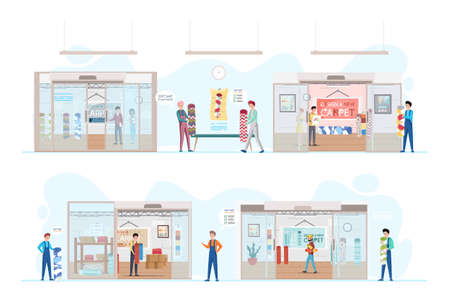Understanding UK Trade Qualifications and Certifications
When working with British electricians, plumbers, and gas engineers, it is crucial to ensure that the professionals you hire are properly qualified and certified. In the UK, trade credentials are not just a formality—they are integral to ensuring safety, legal compliance, and high-quality workmanship. For electricians, always check for NICEIC registration or membership with other government-approved schemes; this demonstrates adherence to strict British electrical standards and regular assessments of competency. Gas engineers must be registered with the Gas Safe Register by law before they can legally work on gas appliances—this protects homeowners from unqualified or unsafe work. When it comes to plumbers, qualifications such as City & Guilds certifications indicate formal training and a solid understanding of plumbing systems in line with UK regulations. Insisting on these recognised credentials helps guarantee that your project complies with British building standards and gives you peace of mind throughout any renovation or installation process.
2. Navigating Health and Safety Regulations
When collaborating with British electricians, plumbers, and gas engineers, understanding the UKs rigorous approach to health and safety is paramount. The cornerstone of these expectations is the Health and Safety at Work Act 1974, which places a legal duty on employers and workers alike to ensure a safe working environment. Compliance isn’t just a legal necessity—it’s deeply embedded in the culture of UK construction and refurbishment projects.
Understanding Core Legal Obligations
The Health and Safety at Work Act sets out clear responsibilities for all parties involved in building works. This includes regular risk assessments, method statements before commencing work, and prompt reporting of any incidents or near misses. Site managers are expected to cultivate a proactive safety culture, where everyone from apprentices to seasoned contractors feels empowered to stop work if they spot a hazard.
Personal Protective Equipment (PPE) Requirements
Wearing the correct PPE is non-negotiable on UK job sites. Each trade has specific protective gear requirements, which are strictly enforced and culturally respected. Below is an overview:
| Trade | Essential PPE | Cultural Expectations |
|---|---|---|
| Electricians | Insulated gloves, flame-retardant clothing, safety boots | Consistent use; refusal to work without full PPE is standard practice |
| Plumbers | Protective gloves, goggles, knee pads, overalls | PPE worn even for brief tasks; diligence in cleanliness due to indoor settings |
| Gas Engineers | Flame-resistant overalls, respiratory protection when needed, safety footwear | PPE adherence checked during Gas Safe inspections; strong emphasis on compliance |
Site-Specific Safety Practices
On British construction sites, strict site inductions are carried out before anyone starts work. These inductions cover emergency procedures, first-aid locations, fire exits, and any unique site risks such as asbestos or confined spaces. Daily “toolbox talks”—brief safety meetings—are a hallmark of British site management and are both a regulatory requirement and a cultural norm.
Culturally Expected Behaviours:
- No shortcuts: Following procedures is seen as professional pride rather than bureaucracy.
- Open communication: Raising concerns about hazards is actively encouraged.
- Documentation: Keeping up-to-date records of all safety checks and incidents is essential for compliance and future reference.
In Summary:
Navigating health and safety regulations with British tradespeople goes beyond ticking boxes—it means fully embracing a safety-first ethos that permeates every aspect of the project. By respecting these regulations and practices, you not only ensure legal compliance but also foster trust and collaboration within your team.

3. Key British Building and Installation Standards
When working with British electricians, plumbers, and gas engineers, understanding the key building and installation standards is crucial for ensuring safety, legal compliance, and seamless project execution. The UK upholds stringent regulations, designed to protect both property owners and tradespeople. Here’s an overview of the most essential standards you’ll encounter:
Part P – Electrical Safety
Part P of the Building Regulations is specifically concerned with electrical safety in dwellings. It requires that all domestic electrical installations are designed and installed to prevent fire and electric shock. Only qualified electricians registered with a government-approved scheme (such as NICEIC or NAPIT) are permitted to carry out notifiable electrical work. Upon completion, homeowners should receive an Electrical Installation Certificate or a Building Regulations Compliance Certificate, which are vital for property records and future sales.
The Water Regulations Advisory Scheme (WRAS)
For plumbing works, adherence to the Water Regulations Advisory Scheme is essential. WRAS ensures that all plumbing systems meet strict water safety standards, protecting drinking water from contamination and preventing wasteful usage. Plumbers must ensure that all fittings and appliances used are WRAS approved. Compliance with these regulations is not only a legal requirement but also a mark of professional credibility in the UK.
Building Regulations for Gas Installations
Gas safety is governed by rigorous Building Regulations, focusing on the correct installation, maintenance, and operation of gas appliances. Only Gas Safe registered engineers can legally undertake gas work in homes or businesses. This includes installing boilers, gas cookers, or heating systems. Proper certification—such as a Gas Safety Record—is required upon completion, providing peace of mind that work has been carried out to national safety standards.
Why Adherence Matters
Complying with these regulations isn’t just about avoiding penalties; it’s about ensuring the well-being of occupants and the long-term integrity of your property. Non-compliance can lead to voided insurance policies, difficulties during property transactions, or even criminal charges in severe cases.
Collaborating with Certified Professionals
Always verify that your chosen tradespeople are appropriately accredited and familiar with these key British standards. This proactive approach guarantees quality workmanship while streamlining inspections and approvals—a fundamental best practice when embarking on any renovation or construction project in the UK.
4. Effective Communication and British Worksite Etiquette
Clear, respectful communication is the cornerstone of any successful project involving British electricians, plumbers, and gas engineers. In the UK, project briefs should be comprehensive yet concise, outlining expectations, timelines, and key deliverables. The use of polite and precise language is not only customary but also essential in establishing trust and professionalism on site.
Nuances of Clear Project Briefs
It’s vital to provide written documentation that details every aspect of the job. This helps prevent misunderstandings and ensures that all parties are aligned from the outset. British tradespeople value clarity and appreciate when clients or collaborators take the time to present structured information.
| Briefing Element | Best Practice in the UK |
|---|---|
| Scope of Work | Define specific tasks; avoid ambiguity |
| Timeframes | Agree on realistic deadlines; allow for unforeseen delays |
| Health & Safety Considerations | Reference relevant UK regulations (e.g., Health and Safety at Work Act 1974) |
| Preferred Communication Method | Email for formal updates; phone for urgent matters; WhatsApp sometimes used informally |
Collaborative Working Relationships
A collaborative approach is highly valued on British worksites. Regular meetings—often called “toolbox talks”—help ensure everyone’s voice is heard and foster a team environment. Respect for each individual’s expertise is paramount; it’s common practice to consult specialists before making decisions that affect their area.
Handling Disputes Professionally
Inevitable disagreements are managed with characteristic British politeness. It’s expected that concerns be raised calmly and constructively, preferably in private. Escalation procedures are typically outlined in contracts, but most issues are resolved through open dialogue and compromise.
The Polite, Professional Approach
Punctuality, courtesy, and a tidy workspace define worksite etiquette in the UK. Tradespeople generally address one another formally until invited otherwise and use “please,” “thank you,” and “sorry” frequently. Maintaining this level of professionalism helps projects run smoothly and fosters lasting working relationships.
5. Project Management and Coordination with Tradespeople
Effective Scheduling: The Foundation of Seamless Projects
In the world of British home renovations, orchestrating electricians, plumbers, and gas engineers requires more than just a keen eye for design—it demands impeccable scheduling. To ensure every trade is available when needed, create a detailed project timeline that accounts for lead times, delivery dates, and essential inspections. Regularly update your schedule and share it with all involved parties. Remember, in the UK, tradespeople often juggle multiple projects, so clear communication about dates and expectations is crucial to avoid costly delays.
Managing Expectations: Open Dialogue from Day One
From initial briefings to daily site updates, transparency is key. Set out clear roles and responsibilities for each trade at the outset. For example, electricians may need to complete first-fix wiring before plumbers can begin their pipework. Encourage regular check-ins—either in person or via group chats—so everyone is aware of progress and potential hurdles. Managing expectations means being honest about what’s achievable within certain timeframes, especially when working with listed buildings or properties governed by local council regulations.
Ensuring Smooth Site Access
Site access in the UK can be challenging, particularly in older terraced homes or urban flats. Provide detailed instructions for parking, access codes, and any site-specific quirks such as narrow staircases or communal areas. Make sure all trades have the necessary keys or permissions ahead of time to prevent wasted journeys—a common frustration that can push schedules off track. Consider appointing a site coordinator if your project is especially complex or involves several overlapping trades.
Managing Overlaps: Avoiding Trade Clashes
A harmonious workflow depends on anticipating overlaps between trades. For instance, avoid scheduling plasterers before electricians have completed wiring chases or arranging for gas engineers while painters are finishing up. Use colour-coded Gantt charts or digital project management tools to visualise which trades will be onsite simultaneously and where possible clashes might occur. Foster a culture of mutual respect—encourage tradespeople to communicate directly with each other regarding shared spaces or dependencies.
Timely Completion: Keeping Your Project on Track
To achieve timely completion—a hallmark of professional British renovation—build in contingency days for unexpected issues such as delayed deliveries or last-minute regulation checks. Regularly review progress against your timeline and be prepared to adjust sequencing if one trade falls behind. Most importantly, celebrate milestones with your team; recognising achievements boosts morale and keeps everyone invested in delivering exceptional results for your transformed space.
6. Documentation, Certification, and Handover Processes
In the UK, the final stage of any electrical, plumbing, or gas engineering project is not simply about finishing the work—it’s about ensuring a seamless transition and peace of mind for property owners through thorough documentation and certification. This process is integral to British standards and professional best practice, protecting both homeowners and tradespeople.
The Necessity of Formal Certification
Upon completion of works by electricians, plumbers, or gas engineers, it is essential to obtain official certificates such as Electrical Installation Certificates (EIC), Building Regulations Compliance Certificates, Gas Safety Certificates (CP12), or Water Regulations certificates. These documents not only prove that installations meet statutory requirements but are also vital for future property sales, insurance claims, and ongoing maintenance.
Warranties: Safeguarding Your Investment
In addition to certification, reputable British tradespeople provide warranties on their work and installed products. This is a hallmark of quality assurance in the UK. Always request written warranty information that outlines the terms and duration; this document serves as your safety net should any faults arise post-completion.
User Manuals and Operation Guides
No handover is complete without comprehensive user manuals for new systems or appliances. British custom dictates that installers brief clients on operating procedures, routine maintenance schedules, and troubleshooting tips. Proper filing of these manuals ensures you have ready reference material for safe usage and efficient performance long after the job is done.
Best Practice: Checking and Filing
It is good practice—and often a legal requirement—to cross-check all certificates and documentation before signing off on a project. Make digital copies for secure storage and keep originals in an accessible location. This meticulous approach ensures compliance with UK regulations and supports hassle-free future upgrades or inspections.
By prioritising documentation, certification, and a detailed handover process, you embody the highest standards of British construction culture—providing lasting value and reassurance to every client.
7. Sourcing Materials and Sustainable Practices in Britain
As the landscape of British design and renovation evolves, selecting certified and sustainable materials has become a core component of any successful project involving electricians, plumbers, or gas engineers. Understanding where your materials come from—and their environmental impact—is no longer just an ethical consideration but also a regulatory expectation in many contexts.
The Value of Certified Materials
In the UK, sourcing materials that meet recognised certifications such as FSC (Forest Stewardship Council) for timber or BSI Kitemark for electrical products ensures compliance with British Standards. These certifications guarantee safety, durability, and often energy efficiency, aligning with legal requirements and industry best practice. When working with British tradespeople, always request documentation to confirm that all fittings, cables, pipes, and appliances are properly accredited and traceable to reputable suppliers.
Sustainability at the Heart of Modern Design
Eco-consciousness is shaping the future of home improvement across Britain. Increasingly, projects specify low-VOC paints, recycled insulation, water-saving plumbing fixtures, and energy-efficient lighting as standard. Not only do these choices reduce environmental impact, but they also appeal to the growing market of eco-aware homeowners and tenants. Local authorities may even require evidence of sustainable sourcing in planning applications for larger developments.
Collaboration with Eco-Savvy Tradespeople
British electricians, plumbers, and gas engineers are becoming well-versed in recommending green alternatives—from smart thermostats and LED solutions to rainwater harvesting systems and heat pumps. Collaborating closely with your trades team ensures sustainable options are considered at every phase. Open communication about your sustainability goals allows tradespeople to advise on the latest products that balance performance with environmental responsibility.
The Rising Importance of Eco-Friendly Credentials
With government initiatives such as the Future Homes Standard on the horizon, eco-friendly renovation is set to become even more critical in the UK. Whether upgrading period properties or designing contemporary spaces, prioritising sustainability not only future-proofs your investment but also supports Britain’s national commitment to reducing carbon emissions.
By integrating certified materials and championing sustainable practices throughout your project, you contribute positively to both your immediate environment and the broader community—ensuring your space is as beautiful as it is responsible.


